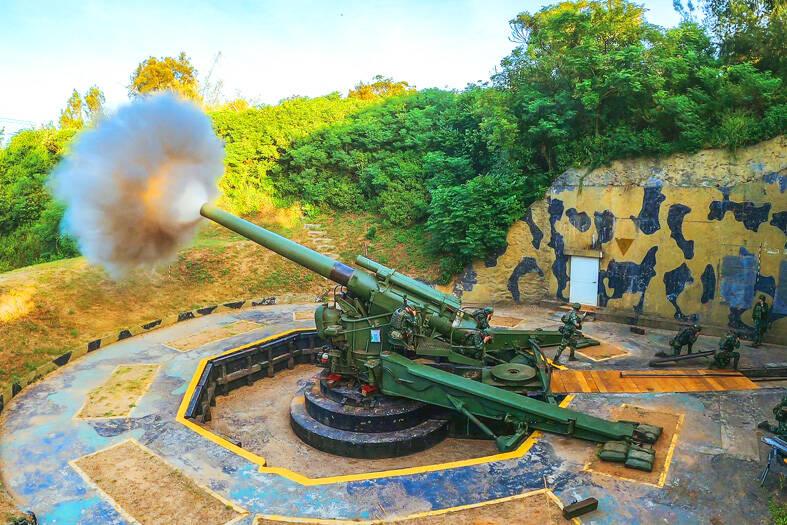The Global Taiwan Institute (GTI), a Washington-based think tank, called on Taiwan to increase its defense budget and procure necessary weapons to comprehensively respond to threats from China in a report released today.
The report, titled “US-Taiwan Relations: Advancing Four Pillars of the Strategic Partnership,” urged the US to more promptly provide Taiwan with critical arms and strengthen joint operational planning and training with Taiwan.
The report reviewed the foundations of US policy toward Taiwan and assessed the development of the US-Taiwan strategic relationship in four key areas: security, international space, economic ties and people-to-people exchanges.

Photo courtesy of the Ministry of National Defense
Amid growing challenges from China, the report offered policy recommendations to maintain peace and stability.
In terms of defense and security, the report said that the US should enhance joint operational planning and training with Taiwan to address scenarios involving hard power threats, coercion and “gray zone” activities.
The report also emphasized that Taiwanese politicians should avoid politicizing defense issues and that Taiwan’s security should remain a bipartisan issue in the US.
US policymakers should assist Taiwan’s diplomatic allies in resisting pressure from China to switch recognition and US Congress should pass the Taiwan Allies Fund Act to provide financial support for such efforts, the report said.
The US and its like-minded partners should also explore innovative ways to allow Taiwanese technical experts to participate in UN technical agency activities, it said.
In the economic realm, the report said the US should send more senior economic officials to Taiwan and encourage more Taiwanese semiconductor and high-tech firms to invest in the US.
Finally, regarding people-to-people exchanges, the report said US-Taiwan exchanges should be expanded into multilateral formats involving like-minded allies to counter China’s attempts to isolate Taiwan.
The US should also regularize high-level visits by officials responsible for people-to-people exchanges, it said.
Separately at a GTI panel discussion yesterday in the US, top US officials said that while Taiwan should increase its defense spending, its defense budget does not need to be 10 percent of its GDP.
Former American Institute in Taiwan director William Brent Christensen said that a 10-percent GDP target is “unrealistic for Taiwan.”
Derek Mitchell, former president of the National Democratic Institute, said that though Taiwan needs to increase its defense spending, strengthening its defense is not solely its responsibility.
The US must also bolster its defense industrial base to more rapidly deliver the needed equipment to Taiwan, Mitchell said.
GTI executive director Russell Hsiao said that a 10-percent GDP defense spending target must be understood in the context of a “denial strategy” aimed at preventing China from taking Taiwan by force.
A “denial strategy” requires US military involvement, and for US defense and policy planners, such involvement must be feasible at an acceptable cost, Hsiao said.
This strategy’s effectiveness depends not only on US commitment, but also on greater investment from allies and partners, he said.

Taiwanese can file complaints with the Tourism Administration to report travel agencies if their activities caused termination of a person’s citizenship, Mainland Affairs Council Minister Chiu Chui-cheng (邱垂正) said yesterday, after a podcaster highlighted a case in which a person’s citizenship was canceled for receiving a single-use Chinese passport to enter Russia. The council is aware of incidents in which people who signed up through Chinese travel agencies for tours of Russia were told they could obtain Russian visas and fast-track border clearance, Chiu told reporters on the sidelines of an event in Taipei. However, the travel agencies actually applied

Japanese footwear brand Onitsuka Tiger today issued a public apology and said it has suspended an employee amid allegations that the staff member discriminated against a Vietnamese customer at its Taipei 101 store. Posting on the social media platform Threads yesterday, a user said that an employee at the store said that “those shoes are very expensive” when her friend, who is a migrant worker from Vietnam, asked for assistance. The employee then ignored her until she asked again, to which she replied: "We don't have a size 37." The post had amassed nearly 26,000 likes and 916 comments as of this

New measures aimed at making Taiwan more attractive to foreign professionals came into effect this month, the National Development Council said yesterday. Among the changes, international students at Taiwanese universities would be able to work in Taiwan without a work permit in the two years after they graduate, explainer materials provided by the council said. In addition, foreign nationals who graduated from one of the world’s top 200 universities within the past five years can also apply for a two-year open work permit. Previously, those graduates would have needed to apply for a work permit using point-based criteria or have a Taiwanese company

The Shilin District Prosecutors’ Office yesterday indicted two Taiwanese and issued a wanted notice for Pete Liu (劉作虎), founder of Shenzhen-based smartphone manufacturer OnePlus Technology Co (萬普拉斯科技), for allegedly contravening the Act Governing Relations Between the People of the Taiwan Area and the Mainland Area (臺灣地區與大陸地區人民關係條例) by poaching 70 engineers in Taiwan. Liu allegedly traveled to Taiwan at the end of 2014 and met with a Taiwanese man surnamed Lin (林) to discuss establishing a mobile software research and development (R&D) team in Taiwan, prosecutors said. Without approval from the government, Lin, following Liu’s instructions, recruited more than 70 software